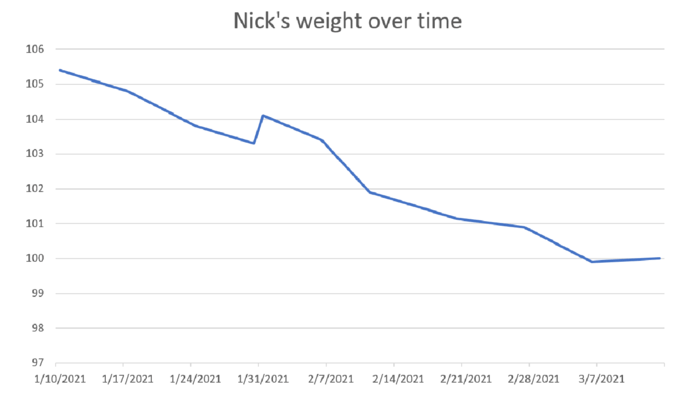Intermittent Fasting
Recently, I started having crippling lower back pain. When I woke up in the morning, I would often struggle to stand fully upright. If I were to walk for longer than a few blocks, I’d need to rest from the tightness/total exhaustion in my lower back.
After consulting with various doctors, I came to the conclusion that the simplest explanation was the best – through quarantine, I had ballooned to 106 kg (234 lbs). While I have an athletic build, I’m only 6 foot (183cm) and, from a typical college weight of 80 kg (180 lbs), this was quite a shock.
Over the past 2 months, I have started intermittent fasting (IF).1 That is, I only eat from noon to around 8pm. The appeal to IF over other diet regimes to me has always been twofold:
- The simplicity – the rules are so clear: eat at these times, don’t eat at these others. It doesn’t require a change in diet, which has downstream requirements of buying new groceries, learning new recipes, changing tastes, etc.
- The observability – it is a simple boolean yes/no if I succeeded on my diet goals today or not. Unlike counting calories/macros or other food-based regimes, the bookkeeping with IF is trivial.
Over the past two months, I’ve noticed that as I restricted the times that I ate, it’s become significantly easier to restrict the amount. I’m guessing it’s because my stomach is somehow contracting a bit as it has 14-16h stretches of being empty. But those long stretches of mild hunger has also just made me less anxious about always needing to be “full.” And this has in turn given me the self-confidence to stretch/play around with my eating window, and set more aggressive health targets.
Consistently measuring my results – by weighing at the same time of day every week, for me Saturday morning – has also helped immensely.2 I think this works for a few reasons. First, you should always “measure what matters” – in this case, this is how I mentally reinforce the importance of weight loss to myself, among all the other competing priorities for my time (family, business, writing). Second, if I’m ever feeling particularly up/down about my progress on any given day, being able to pull up a simple number and a chart is an undeniable, ground truth reality check.
Here are my results so far:
All in all, I’ve lost 6 kg (12 lbs) in just 11 weeks!
My back pain has reduced significantly, almost certainly because I’m putting it under much less constant load, and due to gains from a stretching/exercise routine a physical therapist created for me. Instead of being able to walk just a few blocks before needing a break, I’m able to walk for basically as long as I want to, like before. Instead of waking up to complete stiffness every day, I only get mild tightness in my lower back after an especially strenuous exercise day.
However, I actually think the second-order results are even more interesting and what will really keep me doing this:
- I think clearer and have more energy. I find myself able to read more, do more, and – seeing myself accomplish micro-goals – dream higher. I find myself spending weekends improving the condo with my wife, teaching our daughter how to count, and bringing into reality other pie-in-the-sky ideas, rather than merely “recovering” from the week before.3
- I’m calmer, and have higher tolerance for inconvenience.4 Not eating from 8pm to when I go to sleep around 1am is a constant pain in the ass. On any given night, I’ll probably dream of ordering McDonald’s at least 3 times. However, when I observe myself resisting those cheap thrills, I find it transfers to other areas of life. If there is a complex situation at work or our daughter is throwing a tantrum at home, I find myself much more involved in defusing it, rather than shying away from it.
Overall, it really makes me realize how utterly useless the ancient mental model of mind-body dualism is. There is no split, they are one and the same. And if you want to care for and nurture your mind, you might as well start with your body.
1 Technically, re-started intermittent fasting, as I had done it for a few months successfully a few years back, but lapsed.
2 Because, if you weigh yourself often, you’ll notice how much your weight fluctuates during a given day, just due to it potentially being before/after a meal or a large intake of water/fluids.
3 This blog was one of those ideas!
4 I wouldn’t say I’m quite antifragile with respect to inconvenience, but I could see it happening soon. In a way, my success with this diet is by itself validation to the idea that humans are antifragile, e.g. grow from stress/disorder.
